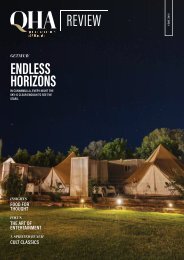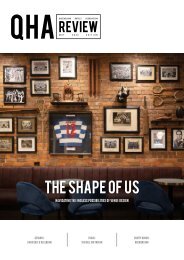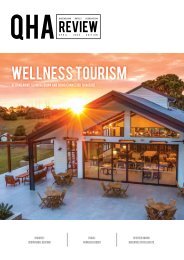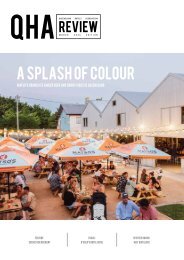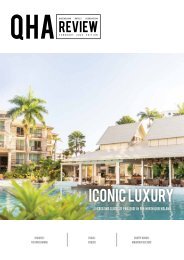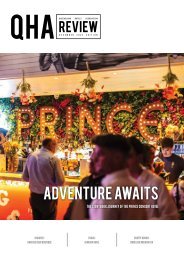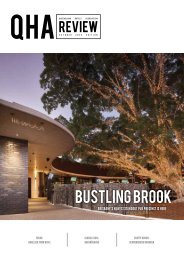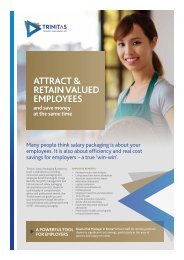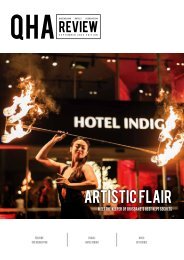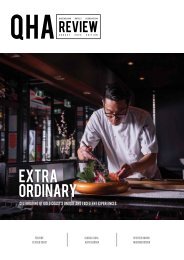QHA_April_Digital
Create successful ePaper yourself
Turn your PDF publications into a flip-book with our unique Google optimized e-Paper software.
INDUSTRY ENGAGEMENT<br />
with Damian Steele<br />
BANNING MEASURES IN QUEENSLAND<br />
<strong>QHA</strong> REVIEW | 44<br />
Refusing entry and/or banning patrons from attending<br />
licensed premises is a decision which should be based<br />
on reasonable grounds, and one which hoteliers<br />
should feel confident and empowered to make in line<br />
with their own policies, responsible service and legal<br />
obligations.<br />
To support licensees maintain a safe environment in<br />
and around licensed premises there are three levels of<br />
bans that can be imposed on patrons:<br />
• court-imposed bans<br />
• police-imposed bans<br />
• venue-imposed bans<br />
There further exists restrictions for venues located in<br />
Restricted Area Communities and in catchment areas<br />
near Restricted Area Communities.<br />
Court-imposed bans<br />
Current legislation provides courts with powers to ban<br />
people from specified licensed premises or specified<br />
areas around licensed premises. Banning orders are<br />
a sentencing option for offences related to violence<br />
or drug trafficking and supply committed in, or in the<br />
vicinity of, licensed premises. A banning order can<br />
also be imposed under the Bail Act 1980 (Qld) as a<br />
condition of bail in the case of offences of violence<br />
in, or in the vicinity of, licensed premises. The courtissued<br />
banning orders can be for up to 12 months, or<br />
longer if attached to a sentence for a criminal offence<br />
and can apply inside and outside of venues.<br />
These powers strengthen the ability of the courts<br />
and police officers to enforce expected standards<br />
of community behaviour, recognising that everyone<br />
deserves to be able to enjoy themselves responsibly<br />
and feel safe in community spaces.<br />
What court-ordered patron bans mean for licensees:<br />
• Through court-ordered bans, patrons who<br />
endanger public safety through violence can be<br />
held to account. There are significant penalties<br />
for persons found to contravene a banning order,<br />
and any breach of a ban made through bail<br />
conditions may also have serious consequences<br />
for the individual, including having their bail<br />
revoked. Penalties include a fine or up to one year<br />
imprisonment.<br />
• The legislation allows for copies of banning orders<br />
to be provided to venues to which the ban relates,<br />
including to approved operators for uploading to<br />
the approved ID scanning system.<br />
Police-imposed bans<br />
The Police Powers and Responsibilities Act 2000 (Qld)<br />
provides police with powers to ban people from:<br />
• entering or remaining in a stated licensed premises<br />
or a stated class of licensed premises<br />
• entering or remaining in a public place located<br />
within a safe night precinct (SNP), and<br />
• an event being held in a public place where liquor<br />
will be sold for consumption at the event.<br />
Police may amend banning notices by issuing further<br />
notices to:<br />
• extend the duration of the initial ban for a total<br />
period of up to 3 months (this can include specific<br />
days or times), and<br />
• include additional relevant public places.



